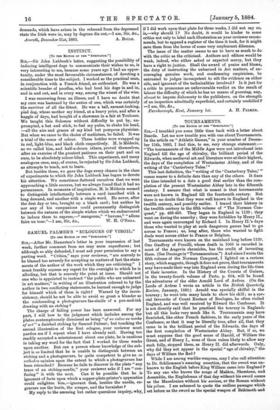INSTINCT.
[To TEE EDITOR OF THE " SPECTATOR."]
Sia,—Sir John Lubbock's letter, suggesting the possibility of inducing intelligent dogs to communicate their wishes to us, is very interesting to me, because some years ago I had an oppor- tunity, under the most favourable circumstances, of devoting a considerable time to the subject. I worked as the practical man, in conjunction with a French friend, an enthusiast. He was a scientific breeder of poodles, who had bred his dogs in and in, and in and out, and in every way, among the wisest of the wise.
I was recovering from an illness, and I have no doubt that my cure was hastened by the antics of one, which was certainly the survivor of all the fittest. He was a tall, earnest-looking, pied dog, whose mother my friend, at a heavy price, and after a haggle of days, had bought of a showman in a fair at Toulouse. We taught this Solomon without difficulty to put by, un- prompted, a hat and stick, to feel my pulse, to shake his head, —all the airs and graces of my kind but pompous physician. But when we came to the choice of medicines, he failed. It was a trial of the sense of colour. Three bottles were wrapped up in red, light-blue, and black cloth respectively. M. le Medecin, as we called him, and half-a-dozen others, proved themselves, after an exercise of the greatest patience on their part and on ours, to be absolutely colour-blind. This experiment, and many analogous ones, may, of course, be rejected by Sir John Lubbock, as attempts to teach, not to learn.
But besides these, we gave the dogs every chance in the class of experiments to which Sir John Lubbock has begun to devote his attention. We sometimes flattered ourselves that we were approaching a little success, but we always found that it had no permanence. In moments of inspiration, M. le Medecin seemed to distinguish intellectually between a card inscribed with a long demand, and another with a single word. He never, after the first day or two, brought up a blank card ; but neither he nor any of his companions could permanently distinguish between the natures of the simple wishes which we endeavoured to induce them to express,—" mangeons," " buvons," " allons






































 Previous page
Previous page